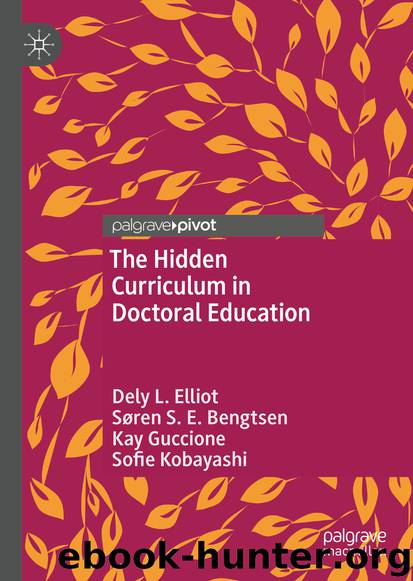The Hidden Curriculum in Doctoral Education by Dely L. Elliot & Søren S. E. Bengtsen & Kay Guccione & Sofie Kobayashi

Author:Dely L. Elliot & Søren S. E. Bengtsen & Kay Guccione & Sofie Kobayashi
Language: eng
Format: epub
ISBN: 9783030414979
Publisher: Springer International Publishing
At first glance, it seems to be her way of ‘coping’ with the doctorate and escape by finding alternative way to spend doctoral time. Actually, this doctoral researcher has nurtured creativity throughout her doctoral studies. Doing so has helped her beyond completing; it has helped her acquire valuable lessons that she then took back and applied to her doctoral learning. For example, her reflection has been instrumental in her becoming more aware of the formal scientific requirements of the doctorate, which is against the philosophical and creative processes involved in doing research. Her metacognitive learning experience has contributed to her becoming more consciously competent in judging the required doctoral requirements. We have chosen this detailed personal account in tandem with the examples we have used throughout the chapter in order to illustrate our key messages.
In summary, the key message is—the ‘value’ that is derived from the doctorate typically comes from an individual’s personal intertwining of the formal and hidden curricula. We stress that the person-centred nature of how this is achieved is important and will depend on several factors, including the researcher’s identity and how they position themselves within doctoral learning. Similarly, their expected outcomes from the doctorate, the structure and quality of the learning experiences on offer (including the micro-contexts they create within formal learning opportunities and the macro-contexts of their department life), and their disciplinary and personal life are equally important considerations.
References
Boud, D., & Lee, A. (2005). Peer learning’ as pedagogic discourse for research education. Studies in Higher Education, 30(5), 501–516.
Download
This site does not store any files on its server. We only index and link to content provided by other sites. Please contact the content providers to delete copyright contents if any and email us, we'll remove relevant links or contents immediately.
Spare by Prince Harry The Duke of Sussex(5197)
Navigation and Map Reading by K Andrew(5158)
Tuesdays with Morrie by Mitch Albom(4784)
Machine Learning at Scale with H2O by Gregory Keys | David Whiting(4313)
Cracking the GRE Premium Edition with 6 Practice Tests, 2015 (Graduate School Test Preparation) by Princeton Review(4294)
Never by Ken Follett(3957)
Goodbye Paradise(3811)
What It Really Takes to Get Into Ivy League and Other Highly Selective Colleges by Hughes Chuck(3760)
Fairy Tale by Stephen King(3399)
Harry Potter and the Prisoner of Azkaban (Book 3) by J. K. Rowling(3360)
Pledged by Alexandra Robbins(3179)
Kick Ass in College: Highest Rated "How to Study in College" Book | 77 Ninja Study Skills Tips and Career Strategies | Motivational for College Students: A Guerrilla Guide to College Success by Fox Gunnar(3131)
Reminders of Him: A Novel by Colleen Hoover(3121)
A Dictionary of Sociology by Unknown(3085)
Sapiens and Homo Deus by Yuval Noah Harari(3072)
The Social Psychology of Inequality by Unknown(3031)
Graduate Admissions Essays, Fourth Edition: Write Your Way into the Graduate School of Your Choice (Graduate Admissions Essays: Write Your Way Into the) by Asher Donald(2923)
Will by Will Smith(2920)
Zero to Make by David Lang(2785)
